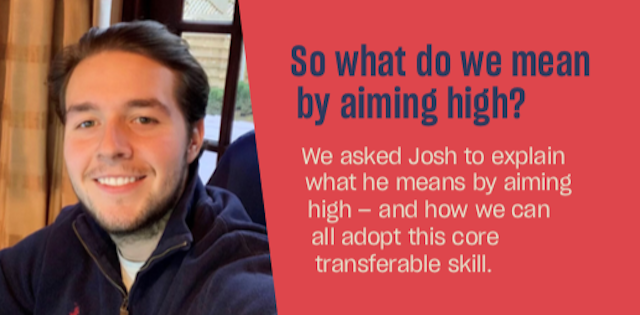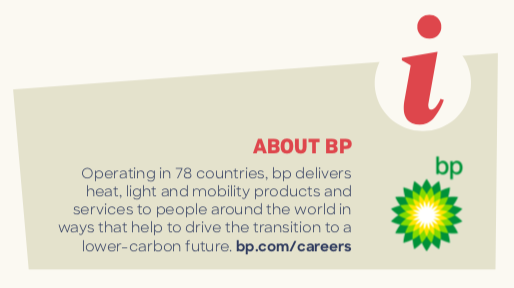Josh Wakefield’s summer internship at bp eventually led to his current role as a trading operator in sustainability.
Josh explains how aiming high, and having a distinct focus at every stage of his career journey, helped him to achieve his goals.
The first thing I’d like readers to understand (especially younger readers) is that aiming high is something that anybody can do. You don’t need specific qualifications, you’re not required to be a certain age, and you don’t need a particular background. So, what’s stopping you from aiming high?
According to the Skills Builder Universal Framework, aiming high is “the ability to set clear, tangible goals and devise a robust route to achieving them”.
I’d say that it isn’t necessarily planning to be in the job at the top of the tree. Aiming high could refer to anything in life; it may just mean pushing for the best possible outcome in the situation you are in. I believe aiming high means looking ahead, setting reasonable expectations, and planning in small steps how you are going to reach your goal. Aiming for the top seems like a big distance to cover, but if you identify the individual steps that will get you to that level, the journey suddenly doesn’t seem so challenging.
Playing to my strengths
So how did I arrive at bp? Throughout school, there was a real push to look towards university, but even when I was 15 or 16, I knew this wasn’t the route I was interested in. Not because I didn’t think it would be enjoyable, but because I knew it wouldn’t have played to my strengths. I was heavily invested in getting into the world of work as quickly as possible. This was the first of many aims.
While completing my Business and Economics course at college, I was introduced to Career Ready — a charity that prepares pupils for the world of work by providing a mentor from business to run masterclasses related to employability. This process culminates in students completing a four-to six-week summer internship at a multinational corporation.
You have to apply for the programme; placements are not just given to pupils. My application involved an interview to discuss why I wanted to be on the scheme and my key areas of interest; this helps Career Ready to identify a suitable placement for each individual. I saw this as an important opportunity for work experience, so my aim shifted to completing schoolwork and achieving a placement on the scheme.
After getting onto the programme, you are paired with a mentor for 12 months; they are there to share their experiences of work and provide helpful advice. My mentor was from investment bank Morgan Stanley and I was fortunate to be selected to join bp for a paid six-week summer internship.
Making a positive impression
Coming into the internship, I knew it was extremely important to make a good impression. This ranged from arriving 15-20 minutes early every day and dressing appropriately to paying attention in meetings and making sure I was always listening. These things may sound obvious, but you would be surprised how big an impact they make in the workplace, especially as a 16- or 17-year-old. My aim was to be remembered by bp.
I left the internship having learned about the different jobs that existed and about the school leaver programme into bp. I enjoyed the atmosphere, culture and the work I’d shadowed. I’d made it clear throughout my internship that I was interested in returning to work for bp full time.
Unfortunately, I didn’t make it onto the school leaver programme – but that leads me to share another key skill: not giving up. I could have let this setback deter me from pursuing a career at bp and looked elsewhere. But I’d received positive feedback from my internship and was determined to continue. My aim shifted to becoming employed by bp.
Half a year passed, and I received a call from a manager at bp. They told me there was a potential opportunity, and that due to my positive performance throughout my internship, they were interested in bringing me in for an interview. This demonstrates how important first impressions and networking can be; without having put effort into both of these, this opportunity would not have come up for me. My aim at this point was to prepare for an interview at bp and to impress the interviewers.
Always learning
I was successful in the job interview, joining bp as an operations co-ordinator. The learning curve was extremely steep. I had a lot to learn coming into the trading and operations environment, but I was always thinking ahead and setting goals. What was it that I wanted to work towards? What was I aiming for?
Currently, I work as a sustainability trading operator on bp’s trading floor and am responsible for the valuable sustainability documentation that accompanies physical deliveries before it is blended into petrol. I learn daily about the different feedstocks and materials that can be used within the petrol blend to increase its greenhouse gas emission saving; and how production plants are using carbon capture technology to become net zero with regard to their product production. With people across the world striving for a more sustainable and environmentally friendly life, I am proud to work within bp’s sustainability department, which is at the forefront of this change.

What is your definition of aiming high?
I consider aiming high to be partly a state of mind. Anyone can aim high; you just need to trust in your ability, and focus on the plan to reach your goals. It’s important always to be looking ahead and asking “how can I better myself? How can I help others around me?” Never become complacent; keep thinking about what the future could hold for your talent.
So what is the difference between aiming high and being unrealistic in your expectations and ambitions?
Personally, I believe anything is achievable in life, as long as you are willing to put in the hard work. If your ambitions seem a lifetime away, plan in small steps for how you can get there. The internet is a wealth of knowledge, enabling you to map out your route and research others who have followed a similar path. Doing this makes the journey seem a lot less daunting and much more attainable. Don’t worry if the plan doesn’t progress as expected. One of the first things I learned in the world of work is that things don’t always go the way you want them to; you’ll need to adapt to new situations.
How can young people develop and hone this skill in everyday life?
I’d suggest beginning by setting a small goal and executing a plan for achieving it in any area of your life — whether that’s breaking down an essay into smaller pieces in order to complete it, or developing a gym workout to improve your fitness. I feel I was subconsciously practising this skill throughout my education and private life, but it’s only when I look back now that I can see what I was doing.
What are the key benefits of aiming high?
For me, it allows some sort of structure for getting to the places I want to reach. Identifying a five-year goal, for example, and breaking it down into yearly targets — or even six-month segments – gives short, sharp and (most importantly) attainable objectives to push towards. Second, I find it motivating. When you accomplish one of these short-term goals, it gives you a sense of achievement. It encourages you to continue to pursue your goal as you are one step closer to that higher aim.
Did aiming high come naturally to you or did you need to develop this attitude consciously?
I feel this skill came naturally to me and it’s only now, looking back, I can identify that I was aiming high throughout school and from the start of my working life. At the time, though, I thought I was just providing a level of structure to my future rather than specifically aiming high. But if it doesn’t come naturally, you can develop it with practice.
For more resources from bp, click here.
These insights were brought to you by Future TalentEd magazine.
This piece was first featured in our Spring 2021 issue of Future TalentEd magazine for careers leaders, parents and students.


















